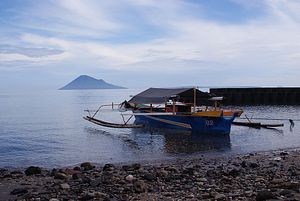Indonesia, Malaysia and the Philippines agreed Monday to future steps as they explore conducting maritime patrols as part of a broader plan to tackle rising security challenges in waters bordering the three countries.
As I noted recently, the Southeast Asian states have been redoubling joint efforts to address problems in the Sulu-Sulawesi seas following a series of kidnappings involving Indonesian and Malaysian sailors carried out by gunmen linked to the Abu Sayyaf Group which operates out of the southern Philippines (See: “Confronting Threats in the Sulu-Sulawesi Seas: Opportunities and Challenges”). These include exploring conducting air and maritime patrols which they have been actively discussing.
Following an initial trilateral “2 +2” meeting of foreign ministers and military chiefs held in the central Java town of Yogyakarta, the three defense ministers met again in Manila on Monday to discuss how to move forward. As I noted previously, the joint statement at the May meeting had suggested that they would look to focus not just on collaborative endeavors like patrols, crisis centers and hotlines, but strengthening cooperation in emergency situations by setting out clear standard operating procedures (See: “Indonesia, Philippines and Malaysia Agree on New Joint Patrols Amid Kidnappings”).
According to a joint statement at the meeting this week seen by The Diplomat, the three countries agreed in principle for their militaries and relevant agencies to explore several measures. The statement mentions areas of immediate interest to outside observers, including trilateral maritime and air patrols in maritime areas of common concern as well as other coordinated activities focused on maritime security.
But equally if not more importantly for seasoned watchers of Southeast Asian security, the statement also included references to how the three sides aim to develop what one official referred to as “the supporting infrastructure” to enable such patrols as well as military cooperation more generally. These include: a Trilateral Maritime Patrol Working Group to set operational guidelines for trilateral maritime patrols, with Maritime Command Centers in each country being responsible for deploying assets; joint military command posts at designated locations to include ad hoc military liaisons on board; a transit corridor to serve as designated sea lanes for mariners entering the maritime area of common concern; a trilateral database sharing mechanism; as well as information and intelligence-sharing.
The statement also urged the armed forces and relevant agencies of the three countries to speed up the finalization of standard operating procedures, which will be a key step for them to move towards more coordinated action. As I mentioned in my previous analysis on confronting threats in the Sulu-Sulawesi Seas, despite the increased momentum towards cooperation, initiatives like trilateral patrols could also face challenges with the three countries having remaining territorial and maritime disputes and needing to resolve nettlesome operational questions about such patrols, including their nature (whether joint or coordinated) as well as specific areas of operation.
































